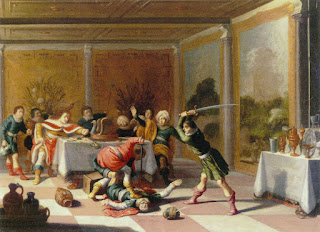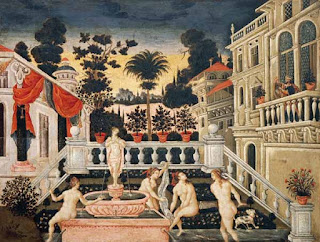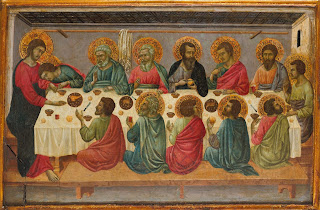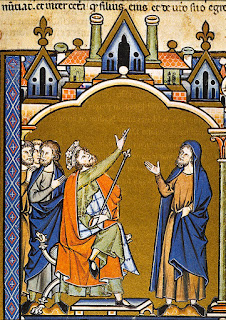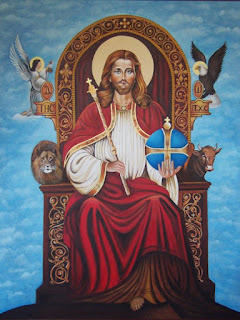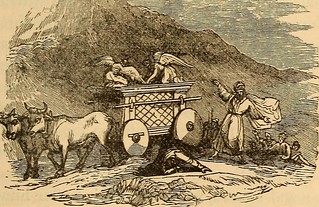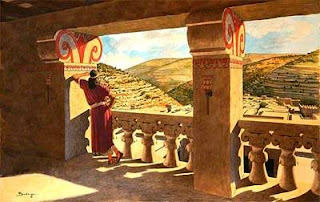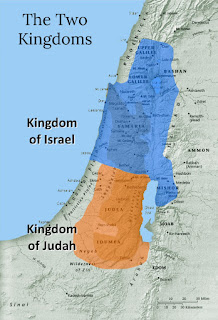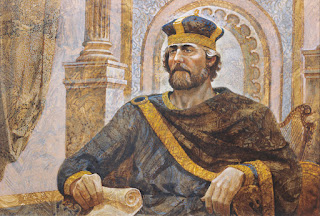2 Samuel 12 features a heartfelt confession on David's part: "And David said to Nathan: I have sinned against the Lord. And Nathan said to David: The Lord also hath taken away thy sin: thou shalt not die" (2 Samuel 12:13). After David's great sin in chapter 11, it is good to see his repentance right away. Nathan, conveying the words of God, chastises David. David could have easily reacted with rage born of pride, he could have had a kingly obstinacy, but instead he acknowledges his sin and the offence it has done to God. This is the one bright spot in this chapter. It is clear that, though David did the right thing by confessing his sin (for which God clearly forgives him), there is much temporal punishment that David will still need to endure; just as Samuel Taylor Coleridge says of his titular character in "The Rime of the Ancient Mariner": "...'The man hath penance done, / And penance more will do.'"
And so we've reached a sort of zenith for David, where it now appears his arc will begin to descend. David's story up till now has been one of ascendancy. His rise is one of the most remarkable stories in the Bible. But when he reaches his peak, and sins with Bathsheba, there is nowhere to go but down (this is not to imply that David descended into eternal punishment, just that his earthly journey would now be filled with suffering). God declares that David's reign would now be filled with war and death, and suffering would be inflicted not just on him but also on his wives and children. And right on cue, we see in chapter 13 that calamity has arrived for his family -- his son Amnon rapes his daughter Tamar, which causes his other son Absalom to murder Amnon. Chapter 13 is grisly. It is clear that discord and evil has entered the royal family, and it is no coincidence that this happens after David's great sin. Things seem to be coming apart at the seams. One reason David's sin is so great is because of the public nature of the scandal. It is said of David in 2 Samuel 12:14, "thou hast given occasion to the enemies of the Lord to blaspheme." When figures of high rank sin so grievously, it very often causes many to discredit the whole institution. And no doubt that is part of the evil one's plan. If the King of all Israel is breaking God's Commandments, why should the rest of us follow them? This reasoning is of course unsound, but those who lack a strong faith could easily be persuaded by it, and those of much influence ought to thus take much caution with this.
One man's literary pilgrimage through the hills and valleys of the Word of God.
Saturday, April 11, 2020
Thursday, April 9, 2020
2 Samuel 10-11: The Fall of the Strong
"Wherefore let him that thinketh himself to stand, take heed lest he fall." (1 Corinthians 10:12)
Up to this point we've seen David as a virtuous figure. His dealings with his persecutor Saul in particular established him as a magnanimous and noble example for all of us in dealing with our enemies. But here in 2 Samuel 11 we see that even the mighty fall. David's infamous affair with Bathsheba shows us that we are all sinners. It would have been consistent with human nature to try and conceal this episode from the story of David. Again, up till now he had been portrayed as a near perfect person. But this major fall from grace (made far worse by how Bathsheba's husband was dealt with) casts a negative glow on David -- and still the writer of 2 Samuel 11, whether that was Nathan or Gad or someone else, did not shrink from showing his king as flawed. It speaks to the veracity of Scripture. Plus, this event leads to many fruitful opportunities for repentance (Psalm 50 comes to mind as a particularly powerful one), thus showing how God brings good out of evil situations.
What struck me most was how David dealt with Uriah, the husband of Bathsheba. At first it just seemed vile and murderous to go after Uriah after committing adultery with his wife. It becomes a twofold sin. And it truly is abhorrent no matter how you think about it. But it's clear that Bathsheba's conceiving of a child was the difference-maker that caused David to go to such drastic lengths. David acted to protect Bathsheba's honor. Her fate would have been much different had he just left her to bear the harsh consequences of a scandalous pregnancy. And of course even after the sordid origins of their relationship, Bathsheba does go on to be the mother of Solomon and thus eventually the queen mother of all of Israel. In the latter role she prefigures the Queen Mother, Mary, mother of Christ the Son of David. Proving once again that God always has the last say and can cause a human failing by His Grace to bear fruit.
Up to this point we've seen David as a virtuous figure. His dealings with his persecutor Saul in particular established him as a magnanimous and noble example for all of us in dealing with our enemies. But here in 2 Samuel 11 we see that even the mighty fall. David's infamous affair with Bathsheba shows us that we are all sinners. It would have been consistent with human nature to try and conceal this episode from the story of David. Again, up till now he had been portrayed as a near perfect person. But this major fall from grace (made far worse by how Bathsheba's husband was dealt with) casts a negative glow on David -- and still the writer of 2 Samuel 11, whether that was Nathan or Gad or someone else, did not shrink from showing his king as flawed. It speaks to the veracity of Scripture. Plus, this event leads to many fruitful opportunities for repentance (Psalm 50 comes to mind as a particularly powerful one), thus showing how God brings good out of evil situations.
What struck me most was how David dealt with Uriah, the husband of Bathsheba. At first it just seemed vile and murderous to go after Uriah after committing adultery with his wife. It becomes a twofold sin. And it truly is abhorrent no matter how you think about it. But it's clear that Bathsheba's conceiving of a child was the difference-maker that caused David to go to such drastic lengths. David acted to protect Bathsheba's honor. Her fate would have been much different had he just left her to bear the harsh consequences of a scandalous pregnancy. And of course even after the sordid origins of their relationship, Bathsheba does go on to be the mother of Solomon and thus eventually the queen mother of all of Israel. In the latter role she prefigures the Queen Mother, Mary, mother of Christ the Son of David. Proving once again that God always has the last say and can cause a human failing by His Grace to bear fruit.
Tuesday, April 7, 2020
2 Samuel 8-9: A Seat at the Royal Table
After subduing more neighboring nations in 2 Samuel 8, we see David in a moment of profound symbolism extend a merciful invitation to one of Saul's descendants, Mephibosheth, son of Jonathan, in chapter 9. David would like to be an example of God's mercy so he seeks out any remaining descendants of Saul, the same Saul who tried to kill him, and in so doing shows us how to love our enemies. Once he tracks down Mephibosheth he tells him, "Fear not, for I will surely show thee mercy for Jonathan thy father's sake, and I will restore the lands of Saul, thy father, and thou shalt eat bread at my table always" (2 Samuel 9:7). A note in my commentary says that an invitation to the king's table was a "mark of the greatest distinction." And it made me immediately think of another connection described by Scott Hahn in his book Reasons to Believe. Hahn says that David "extended covenant loyalty through royal-table fellowship" and "the Psalms of David use images of eating and drinking to celebrate God's provision." In 2 Samuel 7 we saw how the prophet Nathan foretold of how David's kingdom would be everlasting, a prophecy that only makes sense when seen in the light of Christ and His New Testament. And if a seat at King David's royal table was truly a distinguished and important mark, then one would imagine that the Son of David, Jesus Christ, would maintain that importance. This made me see the Last Supper in a whole new way. In Luke 22, which records the Last Supper, Jesus says, "I assign to you, as my Father hath assigned to me, a kingdom, That you may eat and drink at my table, in my kingdom" (Luke 22:29-30). By sitting down at the table with His apostles and eating bread with them, Christ is, like David, mercifully allowing the lowly a place at the royal feast (and by extension, that invitation is given to all of us still!). This "royal-table fellowship" is just one of many connections between David's kingdom and Christ's Kingdom, but it's one that I hadn't before considered. Remarkably, it is found throughout Scripture. In Isaiah 25:6 it is written, "And the Lord of hosts shall make unto all people in this mountain, a feast of fat things, a feast of wine, of fat things full of marrow, of wine purified from the lees." And in Ezekiel 34:23 it is written, "And I will set up one shepherd over them, and he shall feed them, even my servant David; he shall feed them, and he shall be their shepherd." Scott Hahn further says, "eating and drinking with Jesus will be important manifestations of the kingdom's presence." This of course ultimately points toward the Eucharist. All the symbolism of sitting at the royal table means nothing unless it's ultimately tied in with the most important meal of all, the Body and Blood of Christ in the Blessed Sacrament. There have been images and foreshadowings of this most important meal of all throughout Scripture, even going back to the manna in the desert in Exodus. But here in 2 Samuel we see it described for the first time in royal terms, which is significant as it points in a more specific way to Christ's establishment of a kingdom. David may simply be inviting Mephibosheth to his royal banquet, but there is something so much larger being alluded to here, and at the Last Supper we can see the full picture.
Saturday, March 28, 2020
2 Samuel 7 - A Kingdom Forever
"... the Lord had given [David] rest, on every side, from all his enemies." (2 Samuel 7:1)
"... my people Israel... shall be disturbed no more..." (2 Samuel 7:10)
"... I will give thee rest from all thy enemies." (2 Samuel 7:11)
The first item of note in 2 Samuel 7 is the theme of peace that runs throughout. David has repeatedly and soundly defeated the Philistines, so that that neighboring nation appears to no longer be a threat. He has secured the central city of Jerusalem as his capital, a symbolic gesture as much as anything that helped to unite the southern and northern tribes. And he has had the Ark of the Covenant brought from its obscure place to the capital to be housed in a forthcoming grand temple. And God makes it clear in this chapter that He has made all these things possible and is now granting Israel a period of peace. It must have been quite a feeling of relief and gratitude among the Israelites during this time. Though Israel's foray into monarchy was rough at first (and as already stated, not desired by God), it seems at this point God has allowed them a time of peace and prosperity and has permitted this royal arrangement to not only endure but to flourish. And as so often is the case with God, He takes a situation that has been corrupted by man's sinfulness and brings something good out of it. In this case, God uses the monarchical arrangement to reveal to us a model of the eternal kingdom that will be established by His Son Jesus Christ. And that leads us to the most significant facet of 2 Samuel 7: God's covenant with David and its prefiguring of the new and eternal covenant of Jesus Christ.
Through the prophet Nathan, God reveals to David the following prophecy:
"And when thy days shall be fulfilled, and thou shalt sleep with thy fathers, I will raise up thy seed after thee, which shall proceed out of thy bowels, and I will establish his kingdom.
He shall build a house to my name, and I will establish the throne of his kingdom for ever.
I will be to him a father, and he shall be to me a son: and if he commit any iniquity, I will correct him with the rod of men, and with the stripes of the children of men.
But my mercy I will not take away from him, as I took it from Saul, whom I removed from before my face.
And thy house shall be faithful, and thy kingdom for ever before thy face, and thy throne shall be firm for ever." (2 Samuel 7:12-16)
This is a divine covenant. Just as God made a covenant with Moses, Abraham, Noah, and even Adam, God is here making a covenant with David! But this covenant is markedly different. The Davidic covenant is, first of all, the last covenant made before the coming of Jesus Christ. It is also the only covenant to mention a "kingdom" -- a kingdom that God intends all people, not just Jews, to be part of. And before I go any further I must give credit now for what follows to Scott Hahn, whose book Reasons to Believe was eye-opening for me, especially as it concerned the importance of David and his kingdom.
Hahn explains how the prophecy of Nathan here in 2 Samuel 7 (as well as many of the Psalms and other passages of Scripture) is referencing Jesus Christ just as much as it is Solomon, David's heir. Of course directly speaking the prophecy foretells the greatness of David's kingdom, or his "house," under his son Solomon; how God will love Solomon as a son; how a great temple will be built in which the Ark containing God's Holy Presence will reside; and how God will preserve the kingdom "for ever." Solomon of course did indeed build a colossal temple, and his kingdom enjoyed prestige and success far and wide for a long time. But as we know from history, it did not last forever (at least, not in the way the Jews of the time had hoped). And that leads to Hahn's main point. David's kingdom was never meant to be an earthly kingdom forever. It was indeed meant to be everlasting, but not in a material sense. David's heir beyond Solomon would one day be the God Man Himself, Jesus Christ, whose kingdom would be heavenly and the truly eternal kingdom spoken of by Nathan. The kingdom would be the Church established by Jesus in the New Testament. It's why Jesus is called over and over in Scripture "Son of David." Just look at the words of St. Luke at the beginning of his Gospel. He says of Jesus: "He shall be great, and shall be called the Son of the most High, and the Lord God shall give unto him the throne of David, his father: and he shall reign in the house of Jacob for ever. And of his kingdom there shall be no end" (Luke 1:32-33). Scott Hahn writes, "The dynasty of David would never end. Dynasties rise and fall in all other earthly monarchies, but the throne of David would always be occupied by a descendant of David himself." As Luke states (and as it's recorded elsewhere in the Gospels), Jesus is a descendant of David, he is the descendant, the one who will fulfill Nathan's prophecy, who will reveal what God really meant when he blessed David's kingdom and declared it to be an eternal kingdom. It's the only way Nathan's prophecy makes sense. We know that David's kingdom appeared to end when other nations came in and conquered Israel, destroyed the temple, and exiled the Israelites. But the covenant established with David by God held such power in the hearts and minds of the Israelites, that they never really abandoned hope in it. Hahn writes, "the words of the prophets held out the promise, and history recorded God's oracle through Nathan as an unconditional surety." God promised an everlasting kingdom and Israel mostly held on to that promise, even when things seemed utterly dire. The prophets of course, sent by God, helped the people to not forget the Davidic covenant. Isaiah played a large role here -- as Hahn says, "Isaiah prophesied that salvation would come with the birth of an heir to David's throne. The new king's dominion would be vast and would endure 'both now and forever' (see Isaiah 9:5-6)." All this is to say that what is happening here in 2 Samuel 7 has everlasting significance. God, through David, is establishing His kingdom, knowing that its true king, Jesus Christ, will soon be the one to assume David's throne, and that the true nature of the kingdom, that is, the Church established by Christ, will eventually be revealed to all of humankind. One more time from Scott Hahn: "The heart of Jesus' earthly ministry was the proclamation of the kingdom, and His use of that word could mean only one thing to His hearers. They understood Him to mean the restoration of the kingdom of David, and He did not contradict their expectation. In fact, He confirmed it and clarified it, never diminishing its Davidic character." This means that followers of Christ, all members of His Church, even today in the 21st century, are part of David's kingdom. Upon David's throne, Christ has elevated and invited us all, not just the Jews but all men and women of faith, to the royal table to feast with the king. The words of Nathan take on a powerfully sublime meaning when viewed in their fullest and truest sense.
"... my people Israel... shall be disturbed no more..." (2 Samuel 7:10)
"... I will give thee rest from all thy enemies." (2 Samuel 7:11)
The first item of note in 2 Samuel 7 is the theme of peace that runs throughout. David has repeatedly and soundly defeated the Philistines, so that that neighboring nation appears to no longer be a threat. He has secured the central city of Jerusalem as his capital, a symbolic gesture as much as anything that helped to unite the southern and northern tribes. And he has had the Ark of the Covenant brought from its obscure place to the capital to be housed in a forthcoming grand temple. And God makes it clear in this chapter that He has made all these things possible and is now granting Israel a period of peace. It must have been quite a feeling of relief and gratitude among the Israelites during this time. Though Israel's foray into monarchy was rough at first (and as already stated, not desired by God), it seems at this point God has allowed them a time of peace and prosperity and has permitted this royal arrangement to not only endure but to flourish. And as so often is the case with God, He takes a situation that has been corrupted by man's sinfulness and brings something good out of it. In this case, God uses the monarchical arrangement to reveal to us a model of the eternal kingdom that will be established by His Son Jesus Christ. And that leads us to the most significant facet of 2 Samuel 7: God's covenant with David and its prefiguring of the new and eternal covenant of Jesus Christ.
Through the prophet Nathan, God reveals to David the following prophecy:
"And when thy days shall be fulfilled, and thou shalt sleep with thy fathers, I will raise up thy seed after thee, which shall proceed out of thy bowels, and I will establish his kingdom.
He shall build a house to my name, and I will establish the throne of his kingdom for ever.
I will be to him a father, and he shall be to me a son: and if he commit any iniquity, I will correct him with the rod of men, and with the stripes of the children of men.
But my mercy I will not take away from him, as I took it from Saul, whom I removed from before my face.
And thy house shall be faithful, and thy kingdom for ever before thy face, and thy throne shall be firm for ever." (2 Samuel 7:12-16)
This is a divine covenant. Just as God made a covenant with Moses, Abraham, Noah, and even Adam, God is here making a covenant with David! But this covenant is markedly different. The Davidic covenant is, first of all, the last covenant made before the coming of Jesus Christ. It is also the only covenant to mention a "kingdom" -- a kingdom that God intends all people, not just Jews, to be part of. And before I go any further I must give credit now for what follows to Scott Hahn, whose book Reasons to Believe was eye-opening for me, especially as it concerned the importance of David and his kingdom.
Hahn explains how the prophecy of Nathan here in 2 Samuel 7 (as well as many of the Psalms and other passages of Scripture) is referencing Jesus Christ just as much as it is Solomon, David's heir. Of course directly speaking the prophecy foretells the greatness of David's kingdom, or his "house," under his son Solomon; how God will love Solomon as a son; how a great temple will be built in which the Ark containing God's Holy Presence will reside; and how God will preserve the kingdom "for ever." Solomon of course did indeed build a colossal temple, and his kingdom enjoyed prestige and success far and wide for a long time. But as we know from history, it did not last forever (at least, not in the way the Jews of the time had hoped). And that leads to Hahn's main point. David's kingdom was never meant to be an earthly kingdom forever. It was indeed meant to be everlasting, but not in a material sense. David's heir beyond Solomon would one day be the God Man Himself, Jesus Christ, whose kingdom would be heavenly and the truly eternal kingdom spoken of by Nathan. The kingdom would be the Church established by Jesus in the New Testament. It's why Jesus is called over and over in Scripture "Son of David." Just look at the words of St. Luke at the beginning of his Gospel. He says of Jesus: "He shall be great, and shall be called the Son of the most High, and the Lord God shall give unto him the throne of David, his father: and he shall reign in the house of Jacob for ever. And of his kingdom there shall be no end" (Luke 1:32-33). Scott Hahn writes, "The dynasty of David would never end. Dynasties rise and fall in all other earthly monarchies, but the throne of David would always be occupied by a descendant of David himself." As Luke states (and as it's recorded elsewhere in the Gospels), Jesus is a descendant of David, he is the descendant, the one who will fulfill Nathan's prophecy, who will reveal what God really meant when he blessed David's kingdom and declared it to be an eternal kingdom. It's the only way Nathan's prophecy makes sense. We know that David's kingdom appeared to end when other nations came in and conquered Israel, destroyed the temple, and exiled the Israelites. But the covenant established with David by God held such power in the hearts and minds of the Israelites, that they never really abandoned hope in it. Hahn writes, "the words of the prophets held out the promise, and history recorded God's oracle through Nathan as an unconditional surety." God promised an everlasting kingdom and Israel mostly held on to that promise, even when things seemed utterly dire. The prophets of course, sent by God, helped the people to not forget the Davidic covenant. Isaiah played a large role here -- as Hahn says, "Isaiah prophesied that salvation would come with the birth of an heir to David's throne. The new king's dominion would be vast and would endure 'both now and forever' (see Isaiah 9:5-6)." All this is to say that what is happening here in 2 Samuel 7 has everlasting significance. God, through David, is establishing His kingdom, knowing that its true king, Jesus Christ, will soon be the one to assume David's throne, and that the true nature of the kingdom, that is, the Church established by Christ, will eventually be revealed to all of humankind. One more time from Scott Hahn: "The heart of Jesus' earthly ministry was the proclamation of the kingdom, and His use of that word could mean only one thing to His hearers. They understood Him to mean the restoration of the kingdom of David, and He did not contradict their expectation. In fact, He confirmed it and clarified it, never diminishing its Davidic character." This means that followers of Christ, all members of His Church, even today in the 21st century, are part of David's kingdom. Upon David's throne, Christ has elevated and invited us all, not just the Jews but all men and women of faith, to the royal table to feast with the king. The words of Nathan take on a powerfully sublime meaning when viewed in their fullest and truest sense.
Wednesday, March 25, 2020
2 Samuel 6 - Uzzah & the Disrespect
Now that David is in Jerusalem and getting ready to build a grand temple and continue the task of unifying and strengthening Israel, there remains just one more thing to be done: bringing the Ark home. We haven't heard much about the Ark lately; not since the early chapters of First Samuel when we read about the Israelites getting the Ark back from the Philistines and placing it in Cariathiarim. Since then all of the drama unfolded involving King Saul and the transition of power to David. Now that political uncertainty has settled down, attention can once again be payed to this holiest object in the Israelites' possession. The Ark ought to be placed in a prominent, central location, and that is just what David intends to do. The problem, however, as we see in 2 Samuel 6, is that the Israelites, probably because of years being apart from the Ark or forgetting the proper injunctions surrounding it, do not handle it with due respect. This is all illustrated quite powerfully through the figure of Uzzah. Uzzah of course is the poor soul who is struck dead after placing his hand on the Ark, but the problems began before that fateful act. The first mistake David and the Israelites made was to place the Holy Ark of the Covenant on an old wooden cart pulled by oxen. God made clear the Ark was to be carried only by the Levites, the priestly tribe set aside by God for this and many other tasks. This rule was broken (the same way David broke a rule by taking so many wives). As was made clear throughout the law books of the Pentateuch, God desired a priestly tribe, one tribe set apart, reserved to be physically closest to Him in the Tabernacle and in handling the Ark. This rule had been chipped away at slowly over the decades and centuries. We saw Saul make the mistake of assuming certain priestly functions. We've seen it with other Biblical figures. And now we see it with Uzzah. So after transferring the Ark using these lowly, undignified means, Uzzah puts his hand on the Ark to steady it, and is struck dead on the spot. For David it is a wake-up call. Clearly David realizes the mistake they made and immediately has the Ark taken to the home of the Levite Obed-edom. Here God seems to be appeased. Blessings come to Obed-edom for his respectful treatment of the Ark, and it is then allowed to continue its journey to Jerusalem.
The importance of the priests' role seems to be an important theme in this chapter. It's stressed over and over in Scripture that God has strict instructions concerning His worship and He desires them to be followed, not casually shrugged off whenever we feel like it. It's a mark of humility, a virtue much lauded by Our Lord, to submit to His injunctions, both then and now. Today we have, for example, the casual handling of the Blessed Sacrament by means of "extraordinary ministers" of the Eucharist or Communion in the hand, and so on. Clearly these are not the most reverent and respectful ways we could be handling Our Lord. Let us learn from Uzzah and adhere to the strictest reverence when it comes to God's True Presence.
The importance of the priests' role seems to be an important theme in this chapter. It's stressed over and over in Scripture that God has strict instructions concerning His worship and He desires them to be followed, not casually shrugged off whenever we feel like it. It's a mark of humility, a virtue much lauded by Our Lord, to submit to His injunctions, both then and now. Today we have, for example, the casual handling of the Blessed Sacrament by means of "extraordinary ministers" of the Eucharist or Communion in the hand, and so on. Clearly these are not the most reverent and respectful ways we could be handling Our Lord. Let us learn from Uzzah and adhere to the strictest reverence when it comes to God's True Presence.
Tuesday, March 24, 2020
2 Samuel 3-5: David, King!
After a bumpy start, the beginning of David's kingship finally is able to flourish in these chapters. Ish-bosheth, Saul's son and rival claimant to the throne, is killed in chapter 4. In chapter 5 there are no more hurdles for David to clear; God's anointed one can finally assume his destined position as king of all of Israel. And chapter 5 just feels different. There is something grandiose about it. It's the first time Solomon's name is mentioned; there is a prevalent theme of unity; the Philistines are soundly defeated over and over; Israel's power as a nation grows; and the Holy City of Jerusalem, after hundreds of years of being occupied, is finally taken away from the Jebusites. This last event seems to be the most dramatic and significant. When King David takes Jerusalem, he is quick to make it his capital. He begins designs for a great temple atop Jerusalem's commanding hill. In every sense, symbolically and actually, Israelite power is growing and consolidating throughout this chapter and I'd imagine in the many chapters to come. In many ways it is the culmination of events started back in Joshua's days -- Israel's enemies, within and without, are being swept aside and God's promise that the land of Canaan will be theirs seems to finally be becoming a reality in the fullest sense. Although, as a side note, there is a subtle notion in this chapter that all may not be well for long. Moses had foreseen that God would one day permit a king to rule over His people, even though it wasn't what He ideally wanted, and he had written in Deuteronomy 17:17, "[the king] shall not have many wives, that may allure his mind, nor immense sums of silver and gold." Yet, in 2 Samuel 5:13 it is written, "And David took more concubines and wives of Jerusalem, after he was come from Hebron: and there were born to David other sons also and daughters." (One of those sons was of course Solomon, who infamously followed in his father's footsteps in this area.) The point is that David wasn't perfect and this aspect of his kingship, which went against the Mosaic covenant, displeased God. While David's reign may have been full of glory and triumph, it would not last forever. Israel's golden years would be thus short-lived.
Saturday, January 18, 2020
2 Samuel 2 - The Divide
It seems David's path to the throne has hit another stumbling block. After Saul's death, David is only initially able to secure the loyalty of the kingdom of Judah. Saul's son Ish-bosheth (with the help of Saul's general Abner) becomes king of the rest of Israel. Based on the narrative direction of the First Book of Samuel, this isn't the outcome I would've expected. David's ascent has been steady, his only hurdle being Saul himself. He seems as one revered by the people. And his kingship was all but inevitable once Saul left the picture. But where there is God's Will there will always be a force at work against It. The forces, gathered from a place of darkness, do not want David to be king. The Israelites are thus left divided for some time before things break into hostilities. And this is the bulk of 2 Samuel 2. The scenes are striking. First, the clash of the 24 warriors. 12 of David's men, 12 of Ish-bosheth's, like gladiators fighting to the death. They are all slain in the conflict and nothing is accomplished. Then the generals Abner and Joab, fighting on behalf of their kings. The death of Asahel escalates things. Abner's men defeated, and his ignominious march back home. By the end of the chapter it is clear David has the upper hand. But the kingdoms aren't united. The armies are bickering. Joab's brother slain. Animosities flaring up. The transition from Saul to David appears to be anything but a smooth one.
Wednesday, January 15, 2020
2 Samuel 1 - David's Magnanimity
The Second Book of Samuel starts right away with David. King David, as he ought to now be called, shows great magnanimity when met with the news of Saul's death. Saul, the great persecutor of David; Saul, the man obsessed with eliminating David; Saul, the king who saw David as a threat and came close many times to killing him. If anyone should be relieved and even happy to hear that Saul was dead, it would be David, who would no longer need to worry every moment about Saul conspiring to end his life. But no, David reacts with sorrow over the news and immediately rends his garments and weeps and even fasts. Of course, David's sorrow was also directed towards Jonathan, whom he loved dearly. But all the same, David shows no malice, no vengeful joy, no satisfaction at the news. In this moment, David shows himself to be very much a prefigure of Jesus, forgiving his enemies. And Saul, sadly, plays the part of the Jews, in this way: He was anointed first, by the holy Samuel, divinely chosen, much was expected of him, but he failed, was overcome with pride, and when God chose David as the new king, Saul would not accept him.
Saul also demonstrates for us that just because God chooses someone, even bestows graces on him, and elevates him to a prominent position with an important mission, that person can still fall. Free will does not cease to be just because someone is granted a special position by God. Saul, had he not chosen the path of pride, could have been a holy and exalted king. Instead he prefigures Judas.
Saul also demonstrates for us that just because God chooses someone, even bestows graces on him, and elevates him to a prominent position with an important mission, that person can still fall. Free will does not cease to be just because someone is granted a special position by God. Saul, had he not chosen the path of pride, could have been a holy and exalted king. Instead he prefigures Judas.
Subscribe to:
Posts (Atom)
